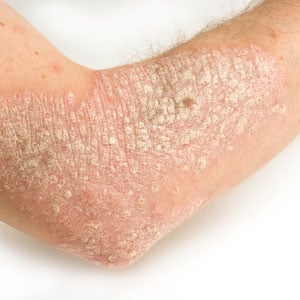
The autoimmune skin disorder known as psoriasis affects millions of Americans, but a new study suggests it remains woefully undertreated.
In 2011, between 30% and nearly 50% of patients said they had no treatment for their psoriasis, depending on the severity of their disease.
One expert unconnected to the study said he wasn't surprised by the findings.
"Dermatologists, especially those that specialise in caring for patients with psoriasis, are well aware of the fact that many patients are untreated or undertreated," said Dr Gary Goldenberg, an assistant professor of dermatology at the Icahn School of Medicine at Mount Sinai, in New York City. "This is especially concerning for those patients with moderate to severe disease and those with psoriatic arthritis, which affects approximately 30% of patients with psoriasis."
Psoriasis is an immune disorder that can cause discomfort and unsightly skin eruptions for patients, another expert explained.
"Psoriasis of the skin is a process where the skin acts as if it's being wounded and accelerates skin cell turnover, so that new skin cells rapidly rise through layers of the skin without having time to mature properly," said Dr Doris Day, a dermatologist at Lenox Hill Hospital, in New York City. "Psoriatic skin sheds in only a few days, which is significantly faster than the approximately 30 day shed cycle of normal skin. This creates thick red plaques on the skin with silvery white scale."
Day noted that people with psoriasis may also suffer from joint pain or pitting of the nails, especially for those with a subset of psoriasis known as psoriatic arthritis. But she added that these and other symptoms can often be managed with newer drugs. "With many of the newer treatments, namely the biologics, they can avoid and even treat joint destruction and the associated pain and co-morbidities [illnesses]," Day said.
A significant problem
Unfortunately, many patients are going without treatment, according to the new study, which appears online on 14 August in JAMA Dermatology.
In the study, researchers led by Dr April Armstrong of the University of California-Davis, in Sacramento, collected surveys from more than 5 600 patients with psoriasis or psoriatic arthritis. The surveys were conducted by the National Psoriasis Foundation (NPF) and collected between 2003 and 2011.
"Nontreatment and undertreatment of patients with psoriasis and psoriatic arthritis remain a significant problem in the United States," Armstrong's group concludes. "Specifically, in 2011 almost half of the patients with mild psoriasis, one-quarter of the patients with moderate psoriasis, and almost 10% of patients with severe psoriasis were not receiving any treatment."
They add that because respondents to the survey were members of the NPF, and were therefore more likely to be engaged in their health care, the actual number of untreated patients is likely to be even higher.
Many patients were also found to be what the researchers called "undertreated" for example, they might be using only a topical cream to ease their psoriasis, when the addition of a systemic drug might help even more.
Patient dissatisfaction
Patient dissatisfaction with treatment was common. More than half (52.3%) of those with psoriasis said they were dissatisfied with their care, as did 45.5% of people with psoriatic arthritis, the study authors said.
Discontinuation of therapy was also widespread among patients, according to the study. The most common reason that patients stopped therapy was unwanted side effects. However, "the inability to obtain adequate insurance coverage was [also] among the top reasons for discontinuation," Armstrong's team wrote.
Goldenberg agreed that there are probably many missed opportunities to help patients fight psoriasis.
"Great advances have been made in psoriasis care, especially with the use of biologics, but a lot of patients are still unaware of these treatments," he said.
"While these new treatments do have potential side effects, with careful monitoring biologics can be used to help many patients with psoriasis and psoriatic arthritis," Goldenberg added. "Disease and treatment awareness are key to improve lives of patients with psoriasis and psoriatic arthritis."
More information
To find out more about psoriasis and its treatment, head to the National Psoriasis Foundation.




 Publications
Publications
 Partners
Partners















